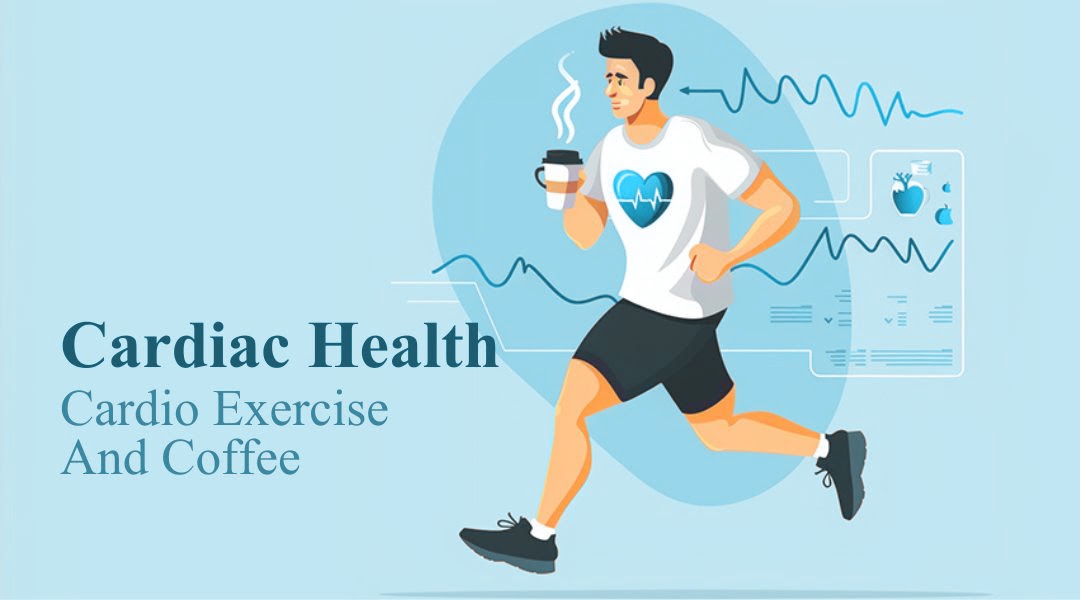
Here’s To Your Heart - An In Depth Look At Cardiac Health, Cardio Exercise, And Coffee
What does it mean to have a healthy heart?
If you feel fine and dandy, does this mean you have little, or nothing, to be concerned about when it comes to your heart?
Is cardiac health only something you should be concerned about as you age?
If you’re in good shape, run marathons for fun, and spend some time each day working out, does this mean you automatically have a healthy heart? And, how important is cardio exercise anyways?
Then, what about diet - specifically your coffee routine - does this positively or negatively affect heart health?
These questions are all very common, but sometimes such inquiries stop there, they’re just passing ponderings.
So today, we’re here to tackle this subject head on, exploring each of the above topics/questions and more as we look at cardiac health, cardio exercise, and coffee!
Defining Cardiac Health
I chose to introduce the topic of heart health with a series of questions, primarily because this line of questioning is common, and each of those inquiries detailed areas we’ll be discussing today.
What I didn’t say, however, is the likely reason so many folks ponder such things is because it is widely known that heart disease is the leading cause of death in the US for both men and women.
In other words, heart health is serious!
So, before we go much further, let’s examine exactly what is meant by heart, cardiac, or cardiovascular health.
Cardiac health simply refers to the health of your heart. Or, to put it a bit more specifically, cardiovascular health refers to the health of both your heart and your blood vessels, as these greatly impact your heart.
Why is it monumentally important to have a healthy heart, you ask?
Because, your heart’s primary job is to pump blood all throughout your body. And, this is crucial to all aspects of life as oxygen and other nutrients are carried within your blood, an element desperately needed by your cells, the building blocks of all tissues and organs.
Oxygen gets into your blood through your lungs, then your heart transports it throughout your body through a network of arteries and blood vessels. Likewise, your heart also needs oxygen, and a similar network carries this back to your heart for the same reason.
If your cells don’t receive enough oxygen, they will die.
When cells die due to a lack of oxygen-rich blood, this is referred to as necrosis.
Too much cell death can lead to inflammation, disease, accelerated aging, immune responses, and more.
So, to rephrase and reiterate, why is heart health so important? Because if your heart isn’t healthy it can’t deliver essential nutrients and oxygen to the rest of your body, affecting each and every other organ and tissue, all the way down to the more than 36 trillion cells in your body!
And, this is why it’s monumentally important to live with heart health in mind.
In fact, being conscious of heart health may be the most important decision you can make about your body!

Being cardiac health conscious involves a variety of things, but most importantly, it centers around making routine decisions to intentionally protect this vital organ.
Living with heart health in mind means you:
1. Know and understand any risks you may have of poor heart health. This could involve other health conditions that may put your heart at risk, or even a family history of heart disease. Here are just a few risks to consider…
- Being overweight or obese can result in excess adipose tissue in the thick, middle layer of the heart. Many hormones secreted by this tissue can then cause inflammation, even altering the structure and functionality of the heart.
- High blood pressure causes the blood to flow through your arteries at a “higher than normal” pressure. This means your heart has to strain to pump blood, resulting in a thickening of the heart’s chambers. Unresolved, your heart will eventually not be able to effectively pump enough blood throughout your body, leading to heart failure, and death.
- Diabetes and prediabetes are also detrimental to the health of your heart as, overtime, high blood sugar levels cause damage to the blood vessels and nerves which control your heart.
- High cholesterol can cause plaque to form on the walls of your arteries, and this causes damage and hardening, making it harder for your heart to pump the oxygen-rich blood so desperately needed throughout your body.
2. Make heart health a priority by regularly incorporating healthy choices, those which improve cardiac health. This involves taking action, doing all you can to reduce your risk of heart disease.
- Smoking, even light or occasional smoking, can damage both your heart and blood vessels. Some studies have shown those individuals who quit smoking reduce their risk of heart attacks and death by half or more!
- Eating a diet filled with nutritious, whole foods, avoiding artificial sugars and processed items, can aid in healthy weight management, lower blood pressure, keep cholesterol levels in check, and keep your heart healthy.
- Poor sleep quality or a lack of adequate sleep can really take a toll on your heart as it increases your risk of multiple health conditions, high blood pressure, an increased risk of heart attacks, and much more. Getting 7-9 hours of healthy sleep each night can do a lot to keep stress levels in check, hormones balanced, blood pressure levels healthy, and so much more…all benefiting your heart.
- Move, move, move! Being physically active is an absolute necessity when it comes to having a healthy heart. It positively affects nearly every part of your health, even improving other heart health risk factors such as blood pressure and obesity. In fact, this one is so important, we’re going to dedicate an entire section to this in a moment. (So, stay tuned!)
3. Know the signs of a healthy, or unhealthy, heart.
- It’s hard to measure the health of your heart if you don’t know what to look for, so here’s a few things to consider.
- Regularly check your heart rate: a healthy, or normal, resting heart rate for most adults is between 60-100 beats per minute.
- Focus on breathing. If your heart is healthy and supplying your body with sufficient amounts of oxygen, evidenced by your ability to perform moderately intense physical activities without chest pain, tightness, or difficulty breathing, then your heart is likely working well. However, if you notice it’s difficult to breathe when doing such activities (or lesser ones), this can indicate a problem.
- Low energy levels experienced throughout a normal day, or simply feeling tired all the time, can be a sign that your heart is not able to pump enough nutrient and oxygen-rich blood throughout your body.
- Did you know that your oral hygiene can be an indicator of how healthy your heart is? Studies have shown that those individuals with poor oral hygiene are more likely to have high blood pressure and are at an increased risk for heart attack, heart failure, and stroke. On the reverse side of this, patients with good oral health typically have healthier blood pressure levels.
Now, as we move on, let’s get down to the practicality of it all, putting into motion (pun intended) one of the best ways to improve cardiac health!

Cardio Exercise And Cardiac Health

As I briefly mentioned above, we’d like to focus on one area that immensely impacts the health of your heart: cardiovascular exercise.
This type of activity protects, strengthens, and promotes optimal health within this vital organ, allowing it to do its intended job, not only keeping all your other bodily systems functioning well, but bluntly stated…keeping you alive!
Many of the heart health risks mentioned in the section above are positively impacted by cardiovascular exercise, and these betterments only serve to compound the positive effects this type of exercise has on your heart.
Cardiovascular exercise, or as many term it, cardio, involves any type of movement or rhythmic activity that raises your heart rate.
Aerobic exercise is another familiar name for cardio, and depending on the duration, frequency, and intensity at which you perform such exercises (or movement), these types of activities can aid in weight loss, help you reach health and fitness goals, and of course, ultimately improve the health of your heart.
A sedentary lifestyle, one in which you spend much of your day sitting or lying down, engaging in very little activity, can cause fatty materials to build up in your arteries. This also slows your metabolism, leads to fat and/or weight gain, can increase your blood pressure, and on and on.
Actually, some experts believe sitting more than 6 hours per day can increase your risk of a wide variety of health concerns and chronic diseases.
And, this (to say the least) is why movement is vitally essential to the health of your heart.
To break this down, let’s look at the heart health risks we detailed in the section above, and see how cardio exercise can positively influence each of these areas.
Blood Pressure
When you engage in aerobic exercise, or those types of movements that elevate your heart rate in a healthy manner, this works to improve circulation. As circulation improves, blood pressure and heart rate levels are lowered (overall).
When you regularly engage in cardio exercise, you’re also making your heart stronger. As the heart muscle is strengthened, this allows it to pump blood with ease, reducing the amount of force placed on your arteries, a factor that ultimately keeps your blood pressure at health levels.
Cholesterol
Aerobic exercise, or cardio, works to lower LDL or “bad” cholesterol levels by increasing HDL cholesterol.
LDL cholesterol is a fatty cholesterol that can cause build up and eventually harden your arteries. By increasing HDL cholesterol, this fatty build up can be eliminated, putting less stress on your heart, thereby reducing your risk of heart attack and stroke.
Cardio exercise that is repetitive and works multiple muscle groups, such as brisk walking or jogging, swimming, yoga, and cycling, are known to be the best types of movement for reducing LDL cholesterol.
Obesity
You may typically think of weight loss as it relates to calories, but to get a little more descriptive here, calorie is simply a term used to describe a unit of energy.
When you are physically active, engaging in regular cardio exercise, this increases the total amount of energy expended by your body. This, in turn, actually serves to balance energy within the body, aiding in or prompting weight loss.
Even better, combining cardio exercise and strength training, alternating in these types of activities throughout the week, can increase the rate at which your body burns fat and calories, aiding in both weight loss and weight management.
This type of exercise can also aid in fluid management throughout the body, flushing out toxins and keeping excess fluid away from your heart (as long as you healthily replenish fluids to avoid dehydration).

Diabetes
Most of us know that what we eat affects our blood sugar levels, but physical activity plays a huge role in those levels as well.
Engaging in 30 minutes per day, 5 days per week, of moderate physical activity has been proven to positively affect blood sugar levels as engaging in this type of exercise causes your body to burn blood sugar. This then allows insulin to properly react…in other words, do its job optimally.
Although, if you already have diabetes, there is one caveat here: For those already suffering with diabetes, be sure to monitor your blood sugar levels before, during, and after exercise, and avoid fast paced, competitive sports, sprinting, and heavy lifting (in resistance training) unless otherwise cleared by your physician.
Aside from the benefits of cardio exercise to these primary risks associated with the heart, let’s also consider a few other ways cardio boosts heart and whole body health:
- improves sleep quality and duration
- reduces stress
- relieves depression and anxiety
- expands lung capacity (providing more oxygen for your heart to pump throughout the body)
- reduces the overall risk of heart attack, stroke, heart failure, and nearly all forms of disease
- increases bone density
Now that we’ve covered the benefits of this type of exercise, before we move on to close things out today, here’s a few options for you to consider as you actually get moving, aiming for 30 minutes of aerobic exercise a day, at least 5 days a week, enjoying any of the following:
- Brisk walking
- Jogging or running
- Swimming
- Cycling
- Pickleball
- Tennis
- Hiking
- Basketball
- Jumping rope
- Dancing
- Roller skating
As I’m sure you can imagine, this list could go on and on. So, be sure to make movement a priority, and enjoy it as you improve the health of your heart in the process!
Coffee, Cardio, And Cardiac Health

We didn’t want to leave you without a little nod to how coffee plays a role in heart health…I mean we are all coffee fanatics here, right?
Coffee can benefit your health in many ways, and one of those benefits includes improving the health of your heart.
Many of the benefits cardio exercise brings to the health of your heart, particularly its ability to reduce heart risk factors, are mirrored in coffee.
For instance, “coffee beans have over 100 biologically active compounds. These substances can help reduce oxidative stress and inflammation, improve insulin sensitivity, boost metabolism, inhibit the gut’s absorption of fat, and block receptors known to be involved with abnormal heart rhythms.”
According to the American College of Cardiology, drinking 2-3 cups of clean, pure, healthy coffee each day is linked to maintaining a healthy heart.
In fact, in some studies, participants found that drinking this much coffee daily improved heart health by 10-20%.
Other studies have shown that this amount of coffee consumed daily resulted in the lowest risk (among participants) of cardiovascular disease and death.
Now to compound these effects…
Another powerful benefit of coffee is that it can improve your energy levels and enhance physical performance.
Personally, coffee is one of my favorite ways to fuel my cardio exercise sessions.
I’ve always found that I can push harder, go longer, and feel my best when I have a preworkout drink of some ordinary cold brew (Lifeboost Light Roast is my absolute favorite here) and a scoop or two of clean protein powder.
Coffee provides clean energy to boost physical performance in each of the activities we’ve listed which work to improve the health of your heart.
If you ask me (and the experts) coffee and cardio essentially serves as a double heart health helper…boosting heart health while also fueling those activities which boost heart health…see, a win-win!
So, know your heart health risks, know the signs of a healthy (or unhealthy) heart, make cardio health a priority by incorporating healthy choices in your everyday life, then grab a cup of coffee (2-3 per day to be exact), and be sure to get moving!
Embolden Dark Roast
Enjoy Our Embolden Dark Roast
Check out Lifeboost Coffee Embolden Dark Roast.
Medical Disclaimer
This content is for informational and educational purposes only. It is not intended to provide medical advice or to take the place of such advice or treatment from a personal physician. All readers/viewers of this content are advised to consult their doctors or qualified health professionals regarding specific health questions. Neither Dr. Charles Livingston nor the publisher of this content takes responsibility for possible health consequences of any person or persons reading or following the information in this educational content. All viewers of this content, especially those taking prescription or over-the-counter medications, should consult their physicians before beginning any nutrition, supplement or lifestyle program.

Becky is a mother, educator, and content writer for Lifeboost Coffee. She has had three years’ experience as a writer, and in that time she has enjoyed creatively composing articles and ebooks covering the topics of coffee, health and fitness, education, recipes, and relationships.
- https://chronicdisease.org/page/cardiovascularhealth/#
- https://www.nhlbi.nih.gov/health/heart-healthy-living#
- https://www.ncbi.nlm.nih.gov/books/NBK22227/#
- https://www.ncbi.nlm.nih.gov/pmc/articles/PMC3094097/#
- https://www.wehi.edu.au/research/areas-of-research/cell-death/#
- https://www.ncbi.nlm.nih.gov/books/NBK279250/#
- https://www.ncbi.nlm.nih.gov/pmc/articles/PMC2821141/#
- https://www.livescience.com/health/anatomy/how-many-cells-are-in-the-human-body-new-study-provides-an-answer#
- https://www.nhlbi.nih.gov/health/heart-healthy-living/risks
- https://www.ncbi.nlm.nih.gov/books/NBK535355/#
- https://www.ncbi.nlm.nih.gov/pmc/articles/PMC6179812/#
- https://www.mayoclinic.org/diseases-conditions/high-blood-pressure/symptoms-causes/syc-20373410
- https://www.cdc.gov/diabetes/library/features/diabetes-and-heart.html#
- https://www.nhlbi.nih.gov/resources/take-action-your-heart-get-started-fact-sheet
- https://www.texashealth.org/Health-and-Wellness/Heart-and-Vascular/What-are-the-Signs-of-a-Healthy-Heart#
- https://www.nhlbi.nih.gov/health/heart/smoking/benefits-to-quit#
- https://www.verywellfit.com/everything-you-need-to-know-about-cardio-1229553
- https://www.bhf.org.uk/informationsupport/risk-factors/physical-inactivity#
- https://www.healthpartners.com/blog/health-risks-of-sedentary-lifestyle/#
- https://www.mayoclinic.org/diseases-conditions/high-blood-pressure/in-depth/high-blood-pressure/art-20045206#
- https://www.hopkinsmedicine.org/health/wellness-and-prevention/3-kinds-of-exercise-that-boost-heart-health#
- https://health.clevelandclinic.org/does-exercise-lower-cholesterol
- https://www.hsph.harvard.edu/obesity-prevention-source/obesity-causes/physical-activity-and-obesity/#
- https://www.bmhsc.org/blog/how-you-can-use-exercise-to-lower-blood-sugar#
- https://www.osfhealthcare.org/blog/i-heart-coffee-coffees-health-effects-on-the-heart/#
- https://www.health.harvard.edu/staying-healthy/drinking-coffee-linked-to-healthier-hearts-and-longer-lives
- References for the article to confirm data and information.
Drop a Comment
Question: for health benefits, must the 2-3 cups per day be caffeinated?










